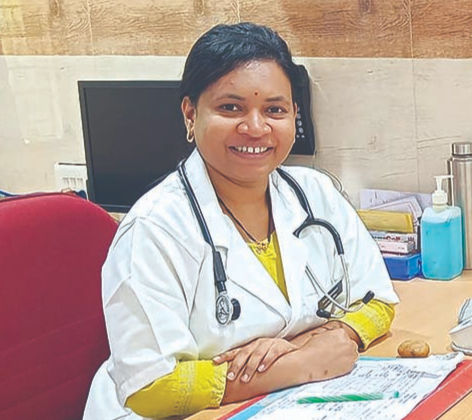We name our daughters Durga, Lakshmi and Saraswati; we worship the divine feminine power in the temples but oppress, repress and even attack the feminine power amidst us. That is the irony in the way India sees its women.
After the safety of the daylight fades, women are seen as easy prey by the predators of the night.
We mark the nine nights of Navratri, the festival of the goddess, by celebrating the dedication and valour of nine real-life women who brave the challenges of the night to pursue their dreams.
PART- 8
Battling Predators
The doctor overcame the fear of Naxalites and the forest while discharging her duties

Dr Mayuri Bhalavi, Doctor, 36
Three years ago, on a rainy night, Dr Mayuri Bhalavi, 36, was walking back to her staff quarters after checking on a patient at the emergency department of the hospital when she “got the biggest fright”. It was post-midnight and the heavy downpour had given birth to a small stream in the campus which Bhalavi had to jump over. “As I approached it, I saw a huge yellow striped snake flowing through the water. I screamed out in fear; I couldn’t move. I ran back to the hospital and asked a colleague to drop me home. That’s the only fear I face when I work here,” she says. Another one, she says, was of Naxalites. Bhalavi’s occupational hazards are far removed from the safety concerns that several other working women face but for her, these are real fears that she strives to overcome everyday.
Bhalavi and her husband are doctors living and working on the SEARCH campus in Gadchiroli, a remote tribal area in eastern Maharashtra. For the past nine years, she’s been living on the campus which offers her convenience and safety. “Everyone lives here like a family so it’s safe,” she says. Bhalavi has never faced any trouble from the patients or their families either. Most patients come from the neighbouring tribal areas and are often known to the doctors at the hospital.
An initial fear she had when she joined the hospital nine years ago was that of Naxalites. None of them, however, scared or troubled any of the doctors which instilled confidence in her. Bhalavi recalls a night when a woman was brought in with severe vaginal injuries. She was summoned to treat the patient along with Dr Rani Bang, co-founder of the SEARCH. Standing there were three burly men and a woman. After the surgery and treatment, Bhalavi was told that they were the Naxalites she feared so much. The only tell-tale signs were their build and their clothes. “Only the Naxalite women wear trousers and shirts, the rest of the women are in saree or salwar suits. They are also well built,” she says. The concern waned as soon as she realised that they came in as any other patients. “Eventually they too were here as patients and not to harm us,” she says.
Challenges for her are more personal and stem from a disrupted routine, missed meals and small health concerns such as acidity. Her duties in the emergency and casualty mean that Bhalavi has to rush to the hospital even in the middle of the night. The late-night calls come at least three times a week. “We have to be on call 24 hours. An emergency can come up anytime,” she says. Often, her sleep is disturbed, which leads to migraine attacks. There are times when she goes without food for long hours if she’s treating patients and that leads to acidity. “Family life and our daily routine suffers for sure when you work night shifts. I tell my patients to follow a healthy lifestyle but mine is often wrong. But then, I am a doctor so my patients come first,” she says.
Born in Amravati, Bhalavi completed her BAMS degree and started working in Wardha as part of a government programme that diagnosed congenital diseases among children. Nine years ago, she and her doctor husband moved to Gadchiroli to work at SEARCH. “I always wanted to work in a tribal area and give back to the people of our community. I live in a remote place but the opportunities and learning is far better than the exposure I would have got in urban areas,” she says. As head of the nursing department, Bhalavi grooms young girls from the tribal communities that surround the SEARCH campus to become able nurses. As she rushes through the wards checking, treating and comforting patients, Bhalavi hopes that she doesn’t encounter snakes as she heads home after a long night at the hospital.

Comments